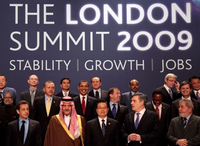The G20 can play global executive, but it needs to delegate rule-setting
 Friday, May 14, 2010 at 12:04AM
Friday, May 14, 2010 at 12:04AM  Good piece by Daniel McDowell at World Politics Review that highlights the natural limits of G20 leadership
Good piece by Daniel McDowell at World Politics Review that highlights the natural limits of G20 leadership
When the finance ministers of the G-20 nations met on the sidelines of the annual IMF-World Bank meetings in Washington last weekend, it marked the sixth time they had convened since the fall of 2008. When the G-20 leaders meet this summer in Toronto, the total number of summits held since the global financial crisis erupted will hit double digits.
And yet, despite early cooperation that addressed the global liquidity shortfall, little substantial progress has been made in the area of international financial regulation. Given the trauma that the entire world economy has suffered, in part due to a lack of such regulation, one would think more headway would have been made by now. A closer look, however, reveals a litany of factors that has created conditions making coordination points incredibly difficult to locate and even trickier to maintain.
Much like my A-to-Z-Rule-Set-On-Processing-Politically-Bankrupt-States, there's a place for executive level decision-making and another for determining the implementing the new rules. So, to me, it's logical for the IMF to step up and assist in this manner. Not a loss or gain of power, but a logical separation.
That's essentially McDowell's excellent advice:
What's needed is an institution with a clear mandate for monitoring and enforcing any agreements reached by the G-20. But creating such an institution from scratch is unlikely given the current distribution of power. The last time major economic institutions were created, the United States had emerged from World War II as a global leader with unparalleled power. Washington led the world in building the Bretton Woods system and was largely able to impose its preferences on weaker powers when there were disagreements. Simply put, coordination is easier when the balance of power so dramatically favors one state.
Today, conditions are obviously less favorable. While the U.S. remains the pre-eminent economic power, its relative dominance has diminished. And when it comes to the issue of financial regulation, America is sorely lacking in leadership credentials given its starring role in the current crisis.
Yet, if the prospects for building a new regulatory architecture appear weak, the G-20 could consider widening the mandate of the IMF to include monitoring and enforcement of any regulatory agreements.
The fund has already rebounded over the past two years from near-irrelevance to play a central role in responding to the crisis, including as an important voice on the issue of regulation. Its monitoring capabilities are unparalleled. Lastly, it's available -- and would likely accept the job.
Agree.










Reader Comments (1)
"America is sorely lacking in leadership credentials given its starring role in the current crisis."
Criminal fraud is endemic in the Wall St Banking firms.
And congress is impotent in regards to banking regulations.
Maybe G-20, or IMF could pressure congress for US banking regulation..
considering Wall St Bankings seminal influence on the World recession.
The ontology of Banking in America is in disarray. Is the root of IMF and G-20 capitalism
rotted?
Gerald
Anthropologist